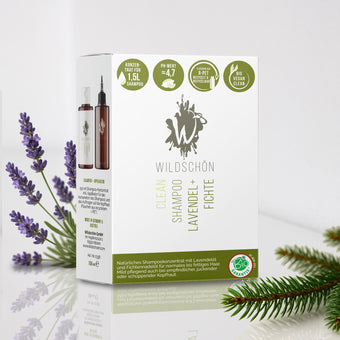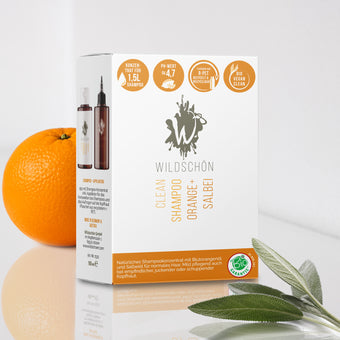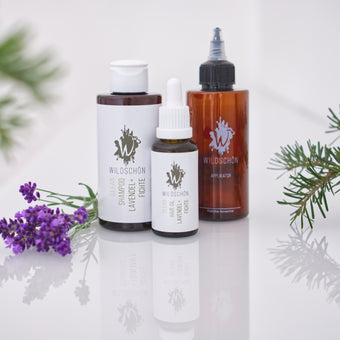All about (wheat) proteins in shampoos
- What do wheat proteins have to do with keratin and hair structure?
- Soft and shiny hair with wheat proteins in the shampoo?
- Are wheat proteins a problem with gluten intolerance?
(Wheat) proteins – that sounds like gym or sports nutrition. What do proteins have to do with shampoos? We explore these and other questions in this article. Because proteins, more precisely wheat proteins, in the shampoo help to ensure that your hair is easy to comb and shiny. That's why we're going to take a closer look at them today.
What are proteins and what are they for?
You may also know proteins by the term "protein", because that's what they are often called. They are among the basic building blocks of all cells and have many functions in our body: they transport substances or control chemical reactions. They can be antibodies or allow muscles to contract by changing their shape. Important things, but what does this have to do with shampoo and hair? With regard to hair, another function of proteins is important: as structural proteins, they give cells their shape and give tissues their strength and elasticity.
Keratin - the stuff hair is made of
The structural protein for hair is keratin. Some shampoos also contain keratin. However, these shampoos do not have a permanent effect on the hair structure. Your hair is made of keratin, but this is formed in the hair root itself. The outgrown keratin - your hair - are no longer living cells. So they cannot metabolize any active substances. However, (active) substances can be attached to them - such as keratin. The effect of a keratin shampoo builds up gradually, i.e. after many hair washes, and only lasts as long as you use the keratin shampoo. That actually sounds good - why is there no keratin in Wildschön Clean Beauty products? This is because keratin cannot be used in its pure form in shampoos. Chemicals and preservatives are often necessary to make it usable in the cosmetics sector (especially with keratin, there is a discussion about formaldehyde). In addition, keratin is often obtained from sheep's wool - so it is not vegan. At Wildschön Clean Beauty, we consistently use natural ingredients that we believe in. That's why we decided against keratin and instead opted for wheat proteins. But what do wheat proteins do in the shampoo? And what are wheat proteins anyway?
Let's start with the question: what are wheat proteins?
Wheat proteins can usually be found on the list of ingredients (INCI) under the English name "Hydrolyzed Wheat Protein". They are an approved ingredient in cosmetics and are classified as safe for health. So far so good - but why are they in the shampoo? Wheat proteins have three important tasks in the shampoo: First, they care for the scalp. Secondly, they have an antistatic effect because they neutralize electrical surface charges (result: the hair flies less ). And third, they are hair conditioning. The latter means: They make your hair easy to comb/brush , supple, soft and shiny. It also gets volume and strength from the wheat protein. It all sounds wonderful – but how does it work?

A smoother surface ensures combability and shine
For this we come back to an active aspect of ingredients in shampoos: the attachment. Because that's exactly what wheat proteins do: they attach themselves to the outer keratin scales on the hair surface and make the hair smoother. Smooth(er) surfaces shine more, and so does your hair. In addition, straighter hair loses less moisture and does not break as easily. With this smoothing effect, wheat proteins help to protect your hair from external influences such as blow-drying. They are therefore also referred to as natural film formers. Incidentally, in conventional shampoos, these effects are often achieved with silicones . You may have just stumbled across the word "hydrolyzed" above. Sounds like something was done to the wheat protein. Exactly this word has something to do with the next question:
How is wheat protein made in the first place?
In this case, the small addition "hydrolyzed" reveals the manufacturing process: hydrolysis. A chemical compound is separated again with the help of water and an acid or enzymes. Substances that have been hydrolyzed were previously connected to another substance. In the case of wheat protein, this was associated with the starch in wheat and is separated from it by hydrolysis. The whole thing works something like this: Wheat flour is mixed with water to form a smooth dough. This dough then rests for some time. The dough is then washed out under water. This means it is kneaded in water until the water is almost clear. Until then, of course, the water has to be changed a few times. A fairly viscous mass remains, which is then dried and ground. Et voilá - there we have it, hydrolyzed wheat protein, ready to add to cosmetic products. Incidentally, the hydrolysis not only separates the wheat protein from the starch, but also makes it so small that it can bond with the outer keratin layer of your hair.
Keyword intolerances: Are wheat proteins in the shampoo problematic?
Some people suffer from gluten intolerance. Gluten is a collective term for protein mixtures found in the seeds of certain grains (e.g. wheat, spelled or rye). Now one could assume that these people with gluten intolerance must also use gluten-free cosmetics. This is partly true, at least if the cosmetic products can get into the gastrointestinal tract. This can be the case with lipsticks or mouthwashes, for example. Even if the amounts are small, it can cause problems for people with gluten intolerance. However, cosmetic products that are only used externally are not a problem here. So as long as you don't drink shampoos containing wheat protein, you can use them without any problems, even if you suffer from gluten intolerance.
Conclusion: Wheat protein is a natural ingredient with many positive effects
Wheat proteins are among the harmless ingredients used in cosmetics. They occur naturally in the wheat grain and are separated from the starch using hydrolysis. As natural film formers, they accumulate on the hair from the outside. This has many positive effects: the hair flies less, it retains moisture better and becomes smoother. This makes them shiny and less likely to break. Wheat proteins also care for your scalp. Since a shampoo is only used externally, shampoos containing wheat protein are not a problem if you have gluten intolerance. If you are now in the mood for naturally beautiful hair, try our Wildschön Clean Beauty Shampoos!









